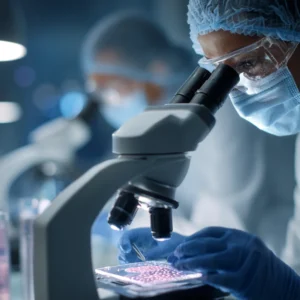Stem Cell Therapy offers promising potential, but like any treatment, it comes with its share of risks. If you’re asking, “What are the long-term side effects of Stem Cell Therapy?”, we’ve got you covered.
If you’re considering Stem Cell Therapy, our team can guide you in deciding if it’s the right fit, help you choose the best clinic & region, and even assist you in securing some great discounts! Fill in our form here to set up a conversation.
Tumor Formation – The Big Concern
One of the most talked-about risks of stem cell therapy is the potential for tumor formation. This is especially true for embryonic stem cells (ESCs) and induced pluripotent stem cells (iPSCs). While these stem cells are incredibly versatile, their ability to divide rapidly means there’s a chance of developing teratomas (benign tumors) or even cancerous growths if the cells aren’t controlled properly.
Don’t worry—researchers are working hard to reduce this risk, but it’s something to keep in mind!
Immune Rejection
The risk of immune rejection is real, especially when stem cells are sourced from a donor (allogeneic cells). Your body might see the transplanted cells as foreign invaders and attack them, leading to complications like inflammation and even graft-versus-host disease (GVHD)Using mesenchymal stem cells (MSCs) or iPSCs created from your own cells can help minimize this risk.
While mesenchymal stem cells (MSCs) show great potential for treatments thanks to their ability to dodge immune attacks and modulate the immune system, they’re not completely risk-free. In many cases, their safety profile looks pretty solid. Researchers are looking into how they can reduce the chances of immune rejection even further.
Genetic Instability
Sometimes, when scientists reprogram adult cells into iPSCs, genetic mutations can occur. These mutations might lead to long-term side effects, such as abnormal cell growth or even cancer. ESCs and iPSCs are still considered experimental in many treatments due to this potential risk
Infections
While infections are generally a short-term risk, they can have lasting effects if not treated quickly. This is particularly true for treatments involving injections or surgeries. Clinics with strong safety protocols can help reduce the risk of infection
Lack of Long-Term Data
The real kicker is that Stem Cell Therapy is still relatively new. Most studies follow patients for only a few years, so we don’t yet know the full extent of potential long-term side effects. MSC-based therapies have shown promise for conditions like joint pain, but how long do those benefits last? We’re still waiting for the full picture
Conclusion: Is Stem Cell Therapy Worth the Risk?
So, what are the long-term side effects of Stem cell Therapy? While risks like tumor formation, immune rejection, and genetic mutations exist—particularly with ESCs and iPSCs—therapies using MSCs are generally considered safer.
However, we need more long-term studies to understand the full scope of long term side effects. To read more about how much Stem Cell Therapy costs, check out this article here.
We provide you with unbiased information helping you learn about Stem Cell Therapy & see if it’s right for you. Our platform can also connect you with the best clinics in the right areas & get you some cool discounts! Fill out our form here to learn more. ( Our Find a clinic page is coming soon!)
Imagine your body getting a VIP treatment! Here’s how it works: First, doctors harvest stem cells from your own body or obtain them from a donor. Technicians process and prepare these little superheroes in a lab. Once they’re ready for action, doctors inject them into the area that needs help—like a worn-out joint or a damaged organ. From there, the stem cells get to work, regenerating tissue and helping your body heal from the inside out. It’s like having your own personal repair crew on call!
Success rates vary depending on the condition, type of stem cells, location of treatment, and overall health.Regulators have approved stem cell therapy for hematologic conditions, and researchers have found more success in treating orthopedic injuries. For anti-aging treatments, success is more anecdotal, with less scientific backing.
Stem Cell Therapy can be safe, but it depends on the type of stem cells used.MSCs, often used in orthopedic treatments, have shown a low risk of side effects, while ESCs and iPSCs carry a higher risk of tumor formation. Whilst short term side effects are pretty nominal, the long term side effects are still unknown.
Fill in your details below
For a discounted offer for Stem Cell Therapy!






